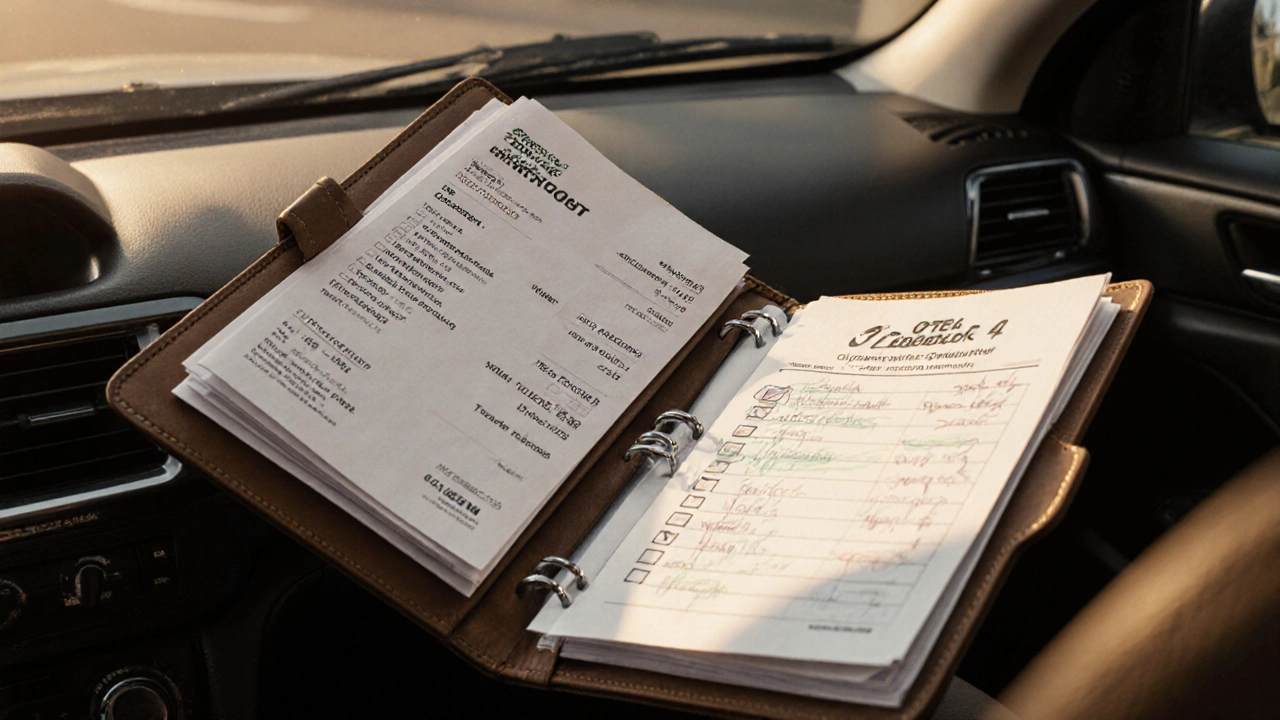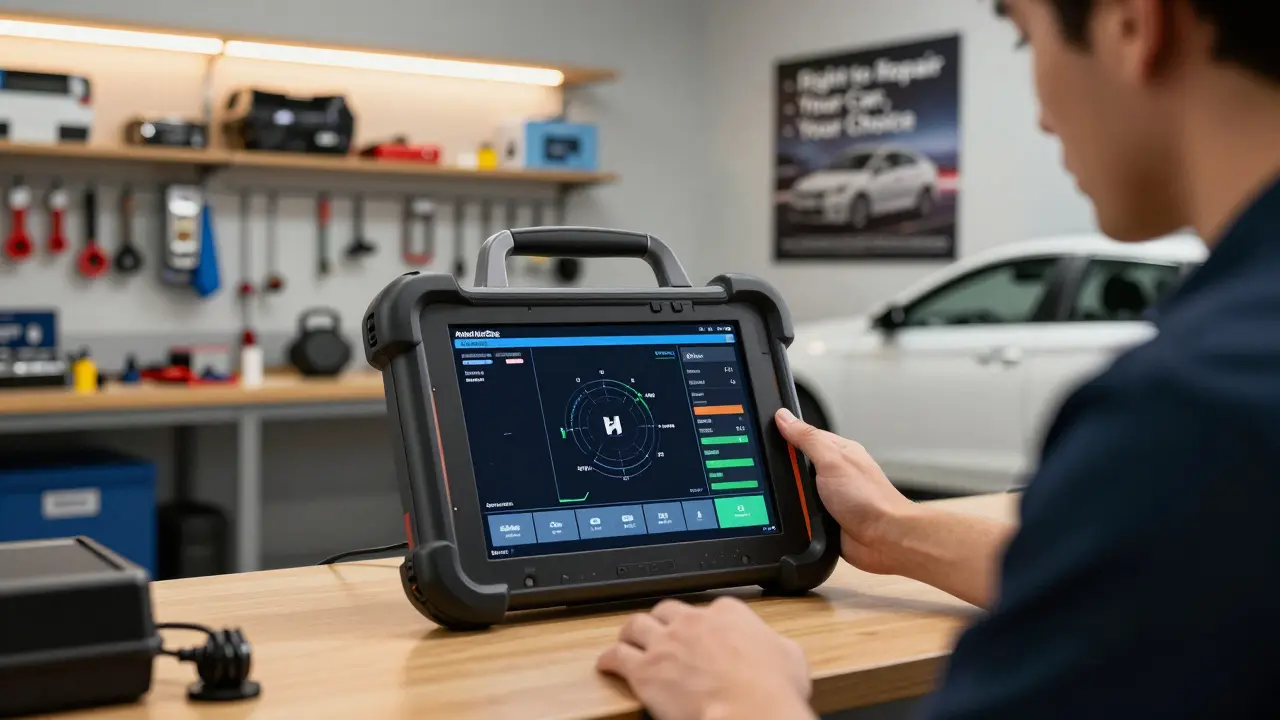When your car breaks down and you’re hoping the warranty will cover the repair, the real question isn’t just what’s broken-it’s can you prove you took care of it. Dealerships and manufacturers don’t approve warranty claims based on trust. They approve them based on paper trails. And that paper trail? It’s your maintenance records.
Why Maintenance Records Matter More Than You Think
Think of your car’s warranty like a contract. You get coverage for defects in materials or workmanship-but not for damage caused by neglect. That’s the fine print everyone skips. If your transmission fails at 65,000 miles and you haven’t changed the fluid since 40,000, the manufacturer will likely deny your claim. Not because the part failed, but because you didn’t follow their basic care rules.
Manufacturers don’t just guess whether you maintained your vehicle. They check. Every time you bring your car in for service, whether it’s at a dealership or an independent shop, the technician logs the work. That log becomes part of your service history. And when you file a warranty claim, they pull that history like a credit report.
A 2024 survey by the Automotive Service Association found that nearly 40% of denied warranty claims were due to missing or incomplete maintenance records. That’s not a small number. That’s nearly half of all claims rejected because someone didn’t keep receipts.
What Counts as Valid Maintenance Records
Not every sticky note or text message from your mechanic counts. Valid records need three things: date, service performed, and who did it.
- Date: Exact or approximate-just not "a while back." If you can’t say when the oil change happened, it’s useless.
- Service Performed: "Oil change" is fine. "Did some stuff" is not. Be specific: "Replaced air filter," "Flushed brake fluid," "Inspected timing belt."
- Who Did It: A dealership stamp or invoice with a shop name and technician ID is gold. Even a receipt from an independent shop with a logo and contact info works.
Some manufacturers, like Toyota and Honda, require records to be from certified technicians or authorized service centers. Others, like Ford and Chevrolet, accept records from any qualified mechanic-as long as the work matches their maintenance schedule.
Keep this in mind: if your owner’s manual says to replace the cabin air filter every 15,000 miles and you skip it, that’s a violation-even if it didn’t cause your AC to stop working. The warranty can still be voided for that alone.
How to Build a Strong Maintenance Record
You don’t need to be a mechanic to keep good records. Here’s how to do it right:
- Ask for a printed receipt or digital invoice after every service. Don’t take "I’ll email it" as an answer.
- Store them in one place. Use a folder, a cloud drive, or even a free app like Carfax a vehicle history report service that allows users to upload and store service records or MileIQ a mileage tracking app that also lets users log maintenance events.
- Take a photo of your odometer each time you get service. That way, you have proof of mileage at the time of work.
- Keep your owner’s manual. It lists exactly what’s required to keep your warranty active. If you lose it, download a digital copy from the manufacturer’s website.
- Don’t wait until something breaks. Start logging from day one-even if you bought the car used.
One customer in Fort Collins had her 2021 Honda Civic’s power steering pump fail at 52,000 miles. She had every oil change and fluid flush documented since she bought it used at 28,000 miles. The dealership approved the claim in three days. The guy next to her, who had no records, was told his warranty was void because the power steering fluid hadn’t been changed at 40,000 miles-even though he swore he did it.

What Happens When You Don’t Have Records
If you lost your records, don’t panic-but don’t expect miracles either.
Some dealerships can pull service history from their own systems if you brought the car in for work before. But if you used an independent shop, they won’t have access. In those cases, you might be able to get a notarized statement from your mechanic saying they did the work. That’s not guaranteed to work, but it’s better than nothing.
Another option: buy a vehicle history report from Carfax or AutoCheck. These services sometimes include service records if the shop reported them. It’s not perfect, but it can help fill gaps.
Still, if you have no proof at all, your best bet is to pay out of pocket. Warranty claims aren’t appeals-they’re audits. And without records, you’re not just out of luck. You’re out of options.
Common Myths About Maintenance and Warranties
There are a lot of rumors floating around. Let’s clear up the biggest ones.
- Myth: "I have to go to the dealership for service to keep my warranty."
Truth: Federal law (the Magnuson-Moss Warranty Act) says you can use any qualified mechanic. The manufacturer can’t void your warranty just because you didn’t go to them. - Myth: "I only need to do the big services-oil changes don’t matter."
Truth: Oil changes are the most common reason warranties get denied. Dirty oil kills engines. If your manual says to change it every 7,500 miles and you wait 15,000, you’re violating the terms. - Myth: "My extended warranty covers everything, so records don’t matter."
Truth: Extended warranties have the same rules. They’re just more strict. They often require proof of every single service interval.
How to Prepare Before You Need a Warranty Claim
Don’t wait for the engine light to come on. Start now.
Open a folder on your phone or computer. Name it "Car Maintenance - [Your VIN]." Every time you get service, save:
- The invoice or receipt
- A photo of the odometer
- The date and mileage
- A quick note: "Replaced brake pads, front only, 58,200 miles, Rocky Mountain Auto Care, Fort Collins"
Set a calendar reminder for your next service date. Even if you’re not due yet, check your manual every six months. Manufacturers sometimes update their maintenance schedules.
If you’re buying a used car, ask for the service history before you sign. If the seller doesn’t have it, assume you’ll be paying for repairs later. That’s not a deal-breaker-it’s just a budgeting tool.
Final Tip: The One Document That Saves You
The most powerful document you can have isn’t a receipt. It’s your owner’s manual with a highlighted maintenance schedule and a checklist you’ve filled out.
Write in the margins: "Oil changed 1/15/2025, 42,100 mi. - Rocky Mountain Auto Care." Cross off each item as you complete it. When you need to file a claim, you don’t need to dig through files. You just hand them the manual. It’s clear. It’s organized. It’s undeniable.
Warranties aren’t magic. They’re insurance policies with rules. And like any insurance, they work best when you follow the rules. Keep your records. Stay on schedule. Don’t assume they’ll believe you. Prove it.
Do I need to keep maintenance records if I have an extended warranty?
Yes. Extended warranties have the same or even stricter requirements than factory warranties. Most require proof of every service interval listed in the owner’s manual. Without records, your claim will likely be denied, even if you paid extra for the coverage.
Can I use an independent mechanic and still keep my warranty valid?
Absolutely. Federal law protects your right to use any qualified mechanic. As long as you use parts and services that meet the manufacturer’s specifications and keep detailed records, your warranty stays intact. The dealership can’t refuse your claim just because you didn’t go to them.
What if I lost all my maintenance records?
If you lost your records, try contacting past service providers for copies. Some shops keep digital records for years. You can also buy a vehicle history report from Carfax or AutoCheck-they sometimes include service data. If all else fails, a notarized statement from your mechanic may help, but approval isn’t guaranteed.
Does the type of oil I use affect my warranty?
Yes. Most manufacturers specify the exact viscosity and certification standard (like API SN or ACEA C3). Using the wrong oil-even if it’s "high quality"-can void your warranty if it causes engine damage. Always check your owner’s manual and keep receipts showing you used the correct type.
How long should I keep maintenance records?
Keep them for as long as you own the car-and at least two years after you sell it. Warranty claims can be filed up to 10 years after purchase for some components, and buyers may ask for records when you sell. Digital copies stored in the cloud are the safest option.
If you drive a car, you’re already paying for protection. Maintenance records are the key that unlocks it. Don’t let a missing receipt cost you thousands.




Cynthia Lamont
November 12, 2025 AT 12:00OMG I just had my warranty DENIED because I didn’t have a receipt for an oil change from 2021. I swear I did it. I even paid cash. Now I’m out $3,200. This post is a nightmare made real.
Kirk Doherty
November 14, 2025 AT 08:36Been keeping receipts since day one. Never had a problem. Simple stuff. Just don’t be lazy.
Dmitriy Fedoseff
November 15, 2025 AT 23:34You know what’s wild? In India, mechanics write your service history in a little notebook they keep for you. No digital receipts. No cloud storage. Just a guy with a pen and a smile. And guess what? They still honor warranties. It’s not about the paper trail-it’s about trust. But here? We’ve turned car ownership into a bureaucratic horror show. We’re not protecting consumers. We’re protecting corporations from accountability.
Colby Havard
November 16, 2025 AT 23:57It is, indeed, a matter of contractual obligation, and not merely one of goodwill or goodwill-based interpretation. The Magnuson-Moss Warranty Act, as codified under 15 U.S.C. § 2302, explicitly permits the use of non-dealership service providers-provided that the service performed is in accordance with manufacturer specifications, and that documentation is maintained in a manner that is verifiable, legible, and timestamped. Failure to adhere to these criteria constitutes a material breach of warranty conditions, and thus, denial of coverage is not only permissible-it is legally mandated.
Kelley Nelson
November 18, 2025 AT 05:32How quaint. I suppose one must now maintain a digital archive, complete with odometer photographs and certified technician signatures, just to avoid being fleeced by a system designed to exploit the unorganized. Truly, the American dream has been reduced to a spreadsheet.
Aryan Gupta
November 18, 2025 AT 08:47They're lying. The real reason they deny claims? They want you to pay for the repairs so they can sell you a new car. Carfax? AutoCheck? All owned by the same corporations that make the cars. They control the data. You're not keeping records-you're feeding the machine.
Fredda Freyer
November 20, 2025 AT 02:48One thing people forget: even if you don’t have receipts, if you can show a pattern-like consistent oil changes every 7,500 miles based on your mileage logs and calendar reminders-that can sometimes sway a claims adjuster. I had a client who used a free app to log every service, even if it was just a note: "Changed oil, 8,200 mi, Jiffy Lube, 3/14/23." They approved his transmission claim because the timeline was flawless. Documentation doesn’t have to be fancy-it just has to be consistent.
Gareth Hobbs
November 21, 2025 AT 09:34Oh for f***s sake, Americans. You can't even keep a receipt? We in the UK have been doing this since the 70s. My Gran had a 1978 Cortina and she kept every scrap of paper in a shoebox. When the gearbox went, she handed the dealer the box and walked out with a new one. Now you lot can't even remember when you last changed the oil. Pathetic.
Zelda Breach
November 22, 2025 AT 22:25Oh wow, so now I’m supposed to take a photo of my odometer after every oil change? What’s next? A notarized affidavit from my mechanic swearing he didn’t nap during the service? This is ridiculous. You’re not fixing a car-you’re filing for a PhD in Auto Bureaucracy.
Alan Crierie
November 23, 2025 AT 06:34Just a gentle reminder: if you’re unsure whether a service counts, ask the shop to write it down. Most will happily do it. And if you’re using an independent mechanic? Send them a quick text: "Can you please email me the invoice? I’m trying to keep records for warranty." They’ll get it. You’re not being annoying-you’re being smart. 💪✅
Nicholas Zeitler
November 23, 2025 AT 10:04STOP waiting until something breaks. Start TODAY. Open a folder on your phone. Name it "Car Records - [Your VIN]." Add every receipt. Add every photo. Add every note. Do it now. Do it before your next oil change. You’ll thank yourself when the transmission goes out at 70K. This isn’t a chore-it’s your financial armor.
Teja kumar Baliga
November 24, 2025 AT 19:27My uncle in Delhi changed his own oil for 20 years. No receipts. No app. Just a notebook with dates and mileage. When his engine failed, he showed the manual with his handwritten notes. They approved it. Sometimes, honesty beats paperwork.